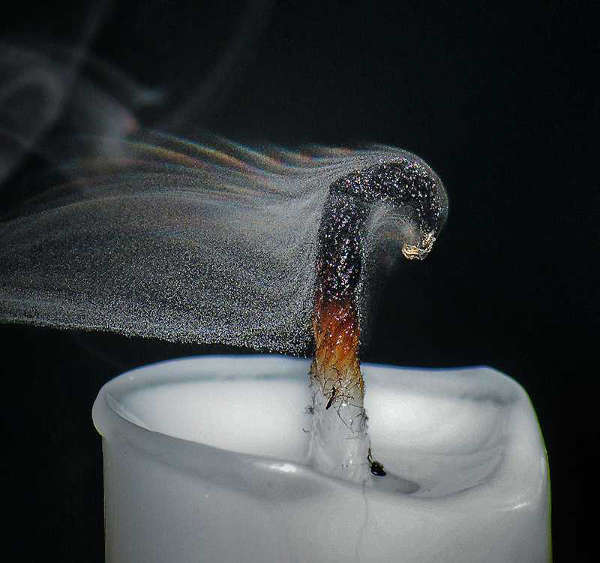FWP:
SETS == A,B
CANDLE: {39,1}
GRANDIOSITY: {5,3}
This simple-seeming verse makes use of one of the common Ghalibian structures: two independent statements, one in each line, with no hint as to how we are to connect them. Do they describe similar situations, or contrasting ones?
Most of the commentators consider that the two lines describe similar situations. On this reading, just as smoke rises from a newly-extinguished candle, seeming to robe it in the black of mourning, so the fire of passion itself became 'black-robed' after the lover died, presumably because of a similar cloud of dark smoke that surrounded its embers. Just as the candle's black mourning attire seems to mourn the death of its own flame, so the mourning attire of the fire of passion seems to mourn the lover's death as the death of its own burning heart, as though he were identified with passion itself.
Faruqi, however, maintains that the two lines describe contrasting situations: 'the speaker's death is not merely like the extinguishing of a candle, but rather it is far beyond it'. We should take seriously the difference between the candle's act of giving vent to smoke 'from within' it, and the fire of passion's much more significant act of becoming wholly 'black-robed'. Faruqi's case is a strong one, especially since it provides a much richer and less obvious meaning for the verse. He is even prepared to rank this verse 'among the best verses in Urdu', which the other commentators with their more conventional interpretation show no inclination to do. The complexity of Faruqi's interpretation stands in piquant contrast to the (apparent) simplicity of the verse.
For more on dead-lover-speaks verses, see {57,1}.

Nazm:
That is, it's not smoke, but rather the flame has become black-robed in mourning for the extinguished candle. In the same way, the flame of passion has become black-robed in grief for me. That is, I burned and melted like a candle from the flame of passion. (52)
== Nazm page 52